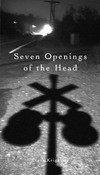
Seven Openings Of The Head
Liane Keightley
conundrum press
$15
paper
128pp
978-1-894994-24-8
Several of Keightley’s gifts as a storyteller, in no particular order, are the ability to move from one event to another over the span of a few sentences with jarring but purposeful rapidity; an aptitude for drawing saturnine characters who nonetheless retain a warped sense of humour and never quite submit to the numbness that threatens to engulf them; and a skill for describing the outdoors, particularly when it’s cold. From the title story: “We were sitting on a bench at the crest of the hill, still wearing our cross-country skis. It was awkward, there was no way for argumentative leg-crossing.” Later, the night air is “sharp as the edge of a tin can.”
Like Denis Johnson, whose seminal short story collection Jesus’ Son features a coterie of stunned young adults showing a similarly rudderless (though perhaps more medicated) disposition, Keightley organizes her stories around varying states of idleness. Sitting lost in the woods at night (“Seven Openings of the Head”), the sense of helplessness that comes with being in a car next to your mother (“You Were Always the Kind One”), and a case of melancholy cabin fever (“Ten-Cent Packs”) form the backdrop for the tests of fortitude and painful revelations that surface during these times of prolonged torpor:
Helen never bothered making the bed; Artie didn’t so why should she. But somewhere along the way he had started to reproach her for things like this. It was a silent reproach, a look, or a frown; a circuitous path around the symptoms of his contempt… They were locked to each other by the silence of the woods.
Also comparable to Johnson is Keightley’s affinity for sharp, evocative similes, stated plainly but with startling acuity, of the kind found in clever song lyrics or, when deployed with the appropriate sting, hardboiled crime fiction. One character goes off the pill while her boyfriend turns to condoms “like a drunk to an AA meeting.” An old country house looks “like the scene of a future crime.” In one story, the protagonist observes her partner just as “a thick spiral of vapour curled up from his mouth like an exiting genie.” In another, cottages and docks are “tucked up all around the edge of the lake like desperate children gathered at a third-rate circus.” Keightley employs figures of speech continually, punctuating a given scene with splashes of rhetorical colour sometimes two or three times in a single paragraph, but never to the point of overwhelming the emotions at play.
Indeed, it is almost as though Keightley’s collection provides an update of Kate Chopin’s The Awakening, one more acquainted with whiskey hangovers and small disappointments. As in that 1899 novella, about an aspiring artist in turn-of-the-century New Orleans seeking (and failing to achieve) self-determination, the characters in Keightley’s fiction are held at a remove from a sense of fulfillment that exists in theory but which remains a vague construction, as improbably elusive as a glass of milk at a dairy festival. mRb






0 Comments